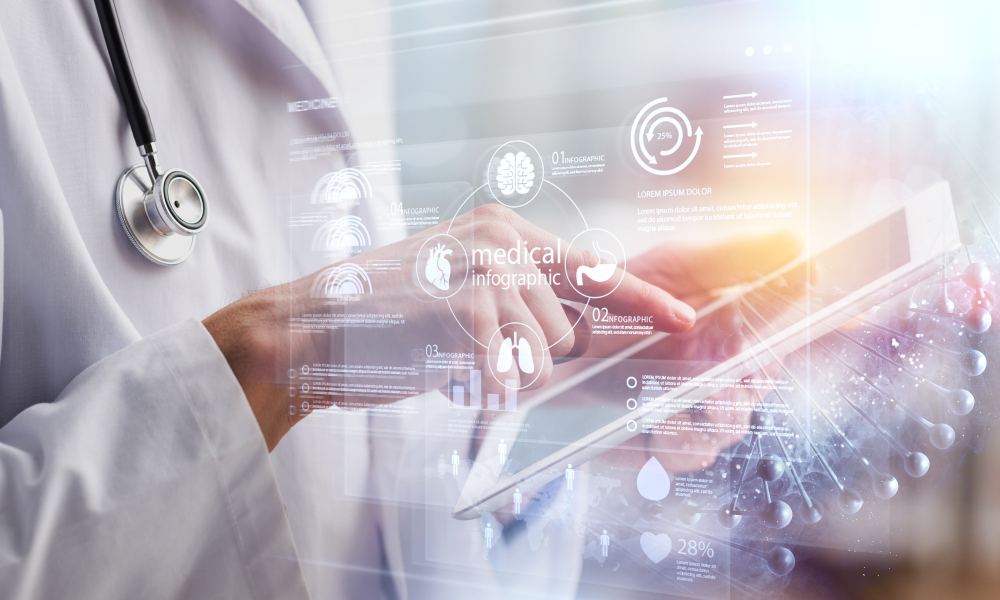The urgency for medical advancement created by the pandemic made a strong case for deploying advanced technology to propel medical research. From scheduling doctor appointments and vaccinations to conducting Artificial Intelligence (AI) enabled diagnosis, technology has penetrated every aspect of healthcare. To thrive amidst unprecedented market shift, there is a need for faster and scalable analysis of data to help accelerate innovation and forge new paths in a post-pandemic world. According to Gartner, by the end of 2024, 75% of enterprises will operationalize AI, driving a 5x increase in streaming data and analytics infrastructures. It is also estimated that, by 2023, more than 33% of large organizations will have analysts practicing decision intelligence.
These estimations are not just numbers, but a projection of how interwoven and integrated medicine and technology are going to be in the near future. Data analytics along with AI can help identify, predict, and plan for natural disasters, pandemics, and other healthcare opportunities even before they occur. We, as an industry, are at the precipice of this disruption and have put in place processes to ensure optimization of this unique opportunity. Given the right inputs, artificial technology can not only complement human labour, but also enable newer use cases that transgress human capabilities.
To automate, simplify and improve multiple functions such as sales, marketing, finance and revenue, organizations need advanced technology. Technology plays a crucial part in healthcare logistics to realign the supply chain to meet the needs of evolving demand patterns.
Data analytics automation, optimization, and Natural Language Processing (NLP) help us gain vital insights and ensure better and faster decision making. This is especially critical in high stress situations such as researching and developing countermeasures to fight the pandemic.
In India, AI played a central role in managing the Covid-19 pandemic. It enabled preliminary screening of COVID-19 cases, containment of the coronavirus, contact tracing, quarantine, and social distancing enforcements, tracking of suspects, tracking the course of the pandemic, timely treatments and remote monitoring of COVID-19 patients, vaccines, and drug development.
Enabling Data Analytics for an enhanced consumer experience
AI and Machine Learning (ML) can automatically analyse large volumes of data, quickly identify patterns, and generate insights. Furthermore, it could make data easy-to-understand by using Natural Language Generation. This allows everyone in the organization to have access to comprehensible data and insights, thereby improving data literacy. AI can empower people to take control of their healthcare needs through easy monitoring and mapping that encourage individuals to adopt healthier habits and proactively manage a healthy lifestyle.
Providing convenience and simplifying your customer’s life are critical in today’s increasingly fast and complex world. This is where technology can bring a disruption in your customer relations and help you reap multiple rewards.
AI-enabled data analytics automation offers several high-value use cases from customer engagement and predictive analytics to product optimization. According to ORF, there are more than 7,000 diagnosed rare diseases in the world and over 350 million individuals suffer from them, with nearly one-fifth in India. In such scenarios, AI can play a vital role to drive awareness around evolving treatments that can help ensure a better prognosis for those living with these diseases.
The future of AI-enabled analytics
An increase in drug-resistance among pathogens, and an anticipated increase in frequency and severity of pandemics opens up huge opportunities for AI-enabled analytics to change the face of medicine by faster and more accurate mapping of drugs.
There is no doubt that AI enabled machine learning and data analytics will significantly change the face of nuclear and precision medicine in the world. It has already facilitated early and accurate detection of life altering diseases like cancer. AI has also improved end-of-life care by helping people to remain independent for longer, reducing the need for hospitalisation and care homes.
AI, automation, and analytics will democratize healthcare
Data automation will democratize healthcare by making it accessible, affordable, and available across the globe. AI will enable healthcare professionals to have better visibility of the day-to-day patterns and needs of the people they care for. Using this information, they will be able to provide better feedback, guidance, and support to keep their patients healthy.
With automation of data in healthcare, there will be a significant reduction in patient risks due to human error. Electronic health records will make diagnosis and patient care swiftly available in all corners of the world.
Using technology, the healthcare supply chain seamlessly connects healthcare manufacturers, payers, providers, and patients. This allows the industry leaders to identify opportunities, that would have otherwise gone unnoticed, and act on them more effectively.
As the world gets ready to adopt AI-based healthcare, it is crucial that there are laws and policies in place to determine the rationality of healthcare decisions based on AI solutions. AI is here to stay, and it is upon us to make sure that we optimize this opportunity to the fullest with robust policies and a strong learning ecosystem to facilitate its seamless adoption.
Written by
Nagaraj Bhat, Vice President and Managing Director, Cardinal Health International India



